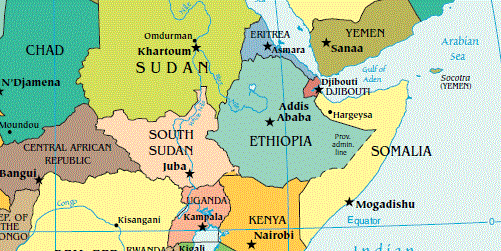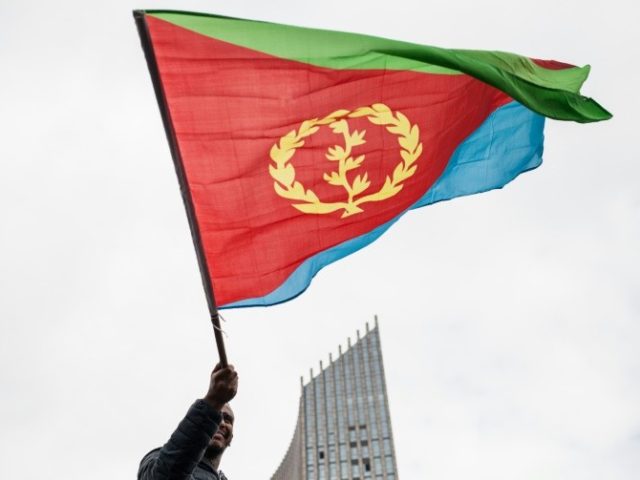This morning’s key headlines from GenerationalDynamics.com
- Djibouti, Eritrea border clash looms after Qatar withdraws peacekeepers
- Tiny Djibouti tries to survive, surrounded by big neighbors
Djibouti, Eritrea border clash looms after Qatar withdraws peacekeepers

Horn of Africa
The dispute between Saudi Arabia and Qatar on the Arabian Gulf has had a ripple effect on the horn of Africa in the form of a potential border clash between Djibouti and Eritrea.
On Friday, Djibouti accused Eritrea of invading and occupying disputed territory along their border. Some Eritrea military officials have confirmed that the charges are true. The invasion occurred after Qatar withdrew hundreds of peacekeeping troops it had on the border, following a major border war between Djibouti and Eritrea in 2008.
As we’ve been reporting, Saudi Arabia led a bloc of Arab countries in imposing a land, air and sea blockade on Qatar, accusing Qatar of funding terrorist acts through the Muslim Brotherhood, and of having too friendly relations with Saudi Arabia’s arch-enemy, Iran.
President Donald Trump’s harsh condemnation of Iran during his May 22 visit to Saudi Arabia triggered a renewal of long-standing vitriolic hostilities between Saudi Arabia and Qatar, and on June 6, the vitriolic words turned into vitriolic actions, when Saudi Arabia, Bahrain, Egypt, and the United Arab Emirates (UAE) all imposed the land, air and sea blockade on Qatar.
In the next few days, other Arab countries, including Djibouti, joined the blockade, while Eritrea refused to cut diplomatic ties with Qatar, saying that it was “impossible to cut ties,” because it had “strong ties with the brother people of Qatar.”
That changed last weekend. Last Sunday, Qatari officials visited Eritrea to firm up its support for the Qatari side. But on Monday, Eritrea announced that it was switching sides and siding with Saudi Arabia against Qatar, issuing a statement:
The decision by Gulf nations is among many in the right direction that envisages full realizations of peace and stability… For Eritrea, this is a timely issue that warrants its active support.
That was all that Qatar could take. On Tuesday and Wednesday, Qatar pulled its peacekeeping troops from the border, and on Thursday Eritrea began its invasion.
Ethiopia has still not taken sides between Djibouti and Eritrea, but has called for dialog to settle the differences. The UN Security Council will meet on Monday to discuss the situation. Al Arabiya (Riyadh) and Africa News and Reuters and Press TV (Tehran)
Tiny Djibouti tries to survive, surrounded by big neighbors
Djibouti is a tiny country, with less than one million population, with high rates of illiteracy, unemployment, and childhood malnutrition. Nonetheless, the country has huge strategic importance, guarding the entrance to the Red Sea.
Djibouti hosts Camp Lemonnier, with more than 4,000 personnel, the largest American permanent military base in Africa. France and Japan launch military operations from Djibouti’s Ambouli International Airport. China also has a military base in Djibouti and is investing heavily in the entire region with infrastructure projects.
Historically, Djibouti’s population consists of two ethnic groups, both nomadic herders. Arabian immigrants came to the country in 3 B.C. and became the Afar ethnic group, who are considered the country’s native population. Shortly thereafter, the Issa ethnic group came from Somalia, and today they are 60 percent of the population. In the 800s, Islam was introduced to the country and it became the first country to adopt Islam in the African continent.
In 1843, French troops came to the country and made the country its colony, later calling it French Somaliland. Following World War II, there were two referendums on the question of independence, one in 1957 and one in 1967, and the referendum failed in both cases. The Afars mostly voted to remain a French colony, while the dominant Issas favored independence, and accused the French of vote-rigging. After the 1967 referendum, France changed the name of the colony to “the Territory of the Afars and the Issas,” in order to give the minority Afars a greater prominence. Finally, on June 27, 1997, France gave up its last colony, and made Djibouti an independent country. In recent years, tensions have been growing between the Afar and Issa tribes.
A border war broke out in June 2008 between Djibouti and Eritrea. In 2009, the UN Security Council approved tough sanctions against Eritrea for supplying weapons to opponents of the Somali government and refusing to resolve border dispute with Djibouti. A peacekeeping mission was set up, using troops from Qatar.
With the Qatar troops leaving, the border war is resuming. The UN Security Council will meet on Monday to decide how to proceed. BBC (16-June-2015) and Nations Encyclopedia and Afar Diaspora Network
Related Articles
- China-built railway in Kenya raises questions about ‘debt trap diplomacy’ (02-Jun-2017)
- Generational history of Ethiopia and Eritrea (14-Jun-2016)
- Eritrea: The most repressive regime in the world (24-Apr-2015)
KEYS: Generational Dynamics, Djibouti, Eritrea, Saudi Arabia, Qatar, Ethiopia, Camp Lemonnier, China, Issas, Afars, Somalia, French Somaliland, Territory of the Afars and the Issas
Permanent web link to this article
Receive daily World View columns by e-mail

COMMENTS
Please let us know if you're having issues with commenting.